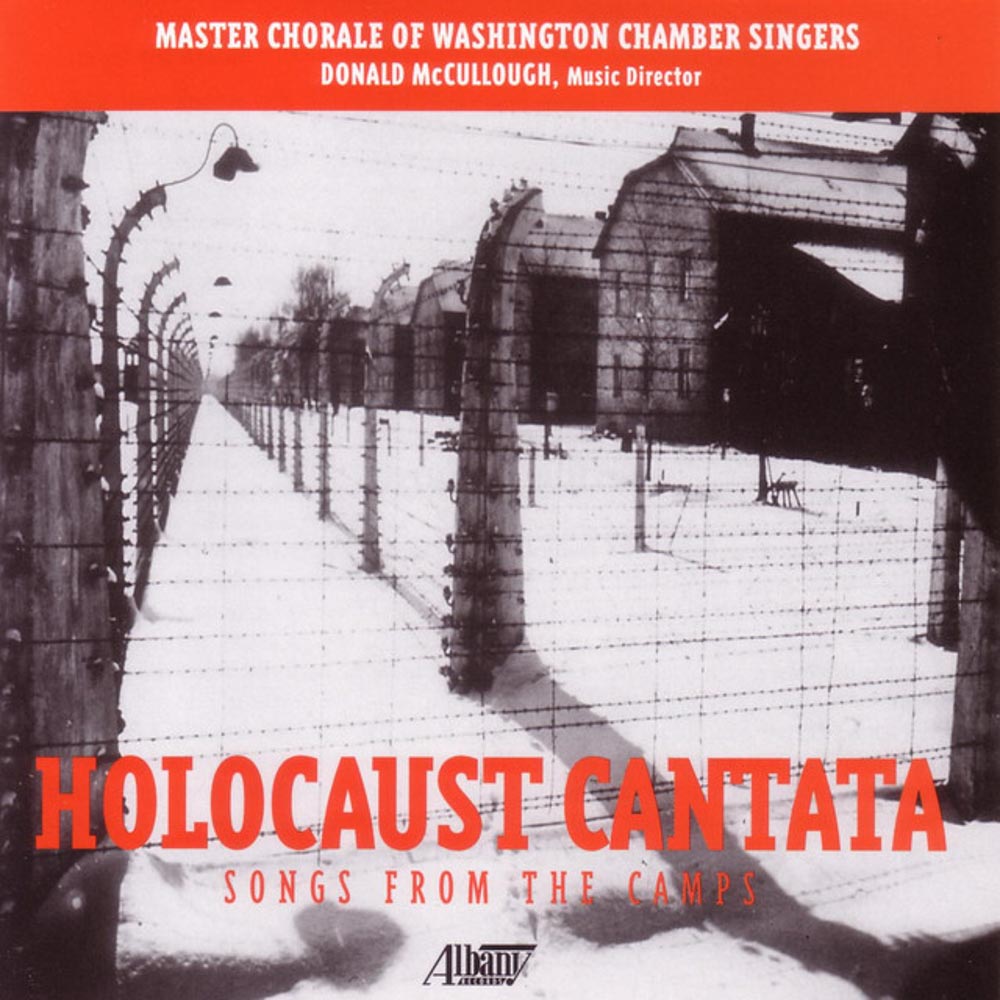Holocaust Cantata
Robert Lamar Sims (piano), Miriam Bolkosky (cello), Washington Chamber Singers Master Chorale, Donald McCullough (conductor)
It is well-known that during the Holocaust inmates wrote music while incarcerated in concentration camps. What about the music that was composed by the common man in these camps? Music embraced by the whole community and passed secretly by aural transmission - music that carried with it powerful words revealing different aspects of camp life, or expressing the inmates' innermost feelings, of mourning, resistance, or patriotism? Was there another Holocaust music from the one we are more familiar with today? Was there a music that spoke with startling immediacy to express the agony of the victims of the Nazi regime? It was this question that first led Donald McCullough on a year-long journey through one of the cruelest chapters of the 20th century. His quest, to extract from the mammoth archives of the United States Holocaust Museum, the material that formed the basis of the Holocaust Cantata , was, like all difficult endeavors, marked with equal amounts of intuition and good luck. The result is the music heard on this disc.
Track Listing
| Title | Composer | Performer |
|---|---|---|
| Even When God is Silent | Michael Horvit | Master Chorale of Washington Chamber Singers, Donald McCullough, conductor |
| A Child's Mystery | Michael Horvit | Master Chorale of Washington Chamber Singers, Donald McCullough, conductor |
| Passacaille for Cello and Piano | Szymon Laks | Miriam Bolkosky, cello, Robert Lamar Sims, piano |
| The Holocaust Cantata | Donald McCullough | Master Chorale of Washington Chamber Singers, Donald McCullough, conductor |
| Is Not A Flower a Mystery? | Donald McCullough | Master Chorale of Washington Chamber Singers, Donald McCullough, conductor |
| We Remember Them | Donald McCullough | Master Chorale of Washington Chamber Singers, Donald McCullough, conductor |
Reviews
- “
"There is no shortage of musical works inspired by the savagery of Adolf Hitler's Germany, but, even among the many, this remarkable cantata stands out. It is special because for the most part the victims are allowed to speak for themselves via their own music. Donald McCullough, director of Washington DC's Master Chorale, crafted the piece after immersing himself in the Aleksander Kulisiewicz Collection at the US Holocaust Museum. Imprisoned for antifascist activities in Poland, Mr. Kulisiewicz spent the war at the Sachsenhausen camp near Berlin where, the informative notes tell us, "he took on the role of camp troubadour, performing his own songs and those of his fellow prisoners."After the War, he crisscrossed the former Reich compiling music that had been composed by inmates of the camps. McCullough had several compositions from the Kulisiewicz Collection translated (with reverence) into English and proceeded to set them for chorus, occasional soloists, cello and piano. His arrangements, interspersed with writings by those forced to endure the unendurable make for a gripping commentary on the resilience of gentle souls caught in the vortex of human depravity at its worst. The songs, as you'd expect, are heart-rendering in their simplicity and their sadness....I pray with all my heart that the nobility of Donald McCullough's work has brought a measure of rest to Kulisiewicz's eternal soul."
*Album cover provided for Editorial use only. ©Albany Records. The Albany Imprint is a registered trademark of PARMA Recordings LLC. The views and opinions expressed in this media are those of the artist and do not necessarily represent or reflect the views and opinions held by PARMA Recordings LLC and its label imprints, subsidiaries, and affiliates.

